- November 28, 2017
- Posted by: Raz Chorev
- Category: Misceleneous
No Comments
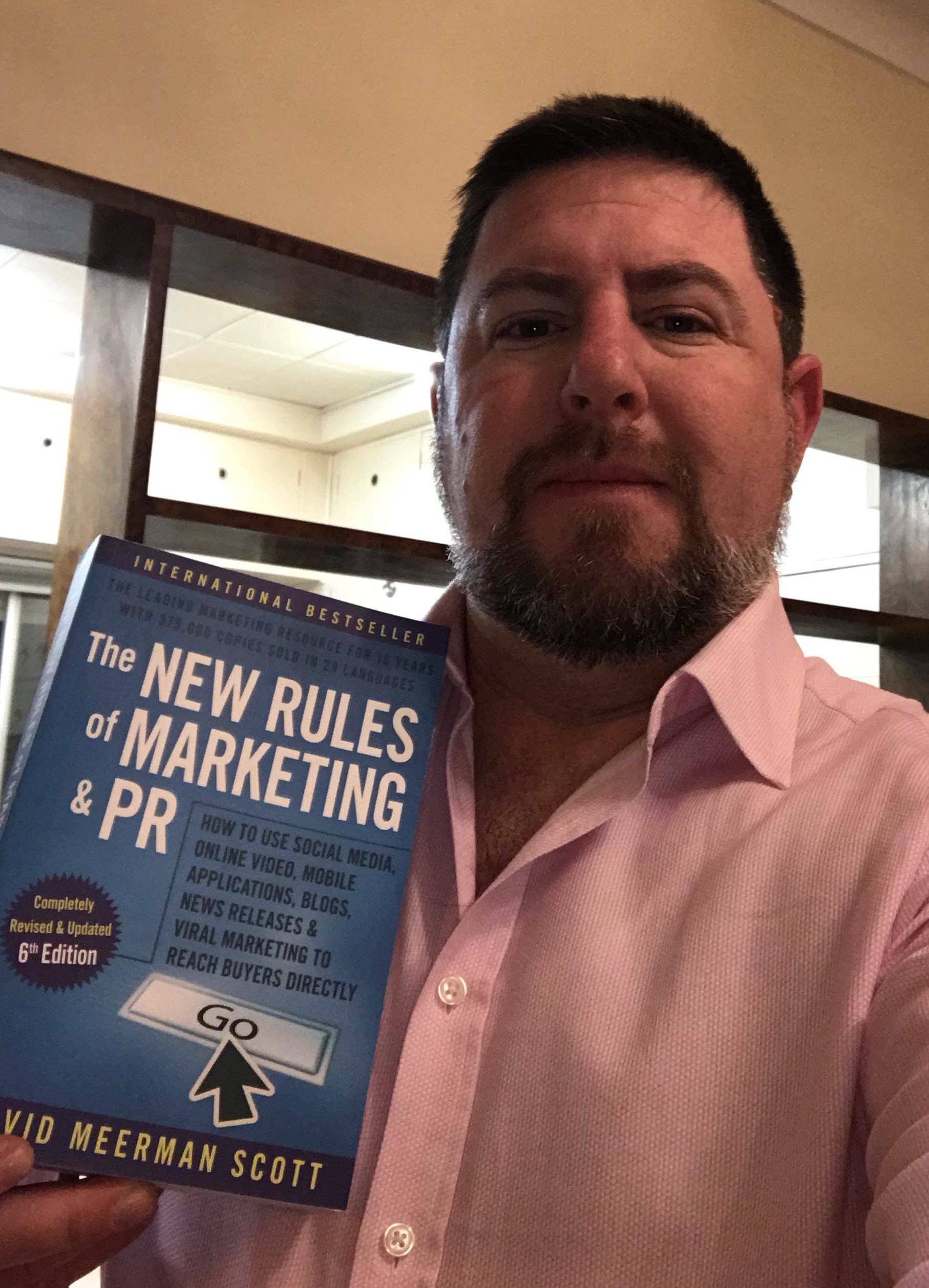
As the holiday season is approaching, I thought I’d share the highlights of my reading list – the best of the books I’ve bought, read and listened to in the past 12 months. 2017 books have a very distinctive theme running through them, and not by design… most of the books I’ve read this year were about change, flexibility of thoughts and perspectives, and understanding past and present, in preparation for the future.
Finding a good book for the holiday isn’t easy, so here’s short selection of my recommended reading:
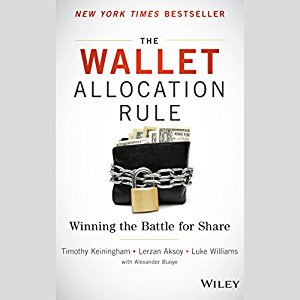 The Wallet Allocation Rule – Winning the battle for share – Timothy Keiningham, Lerzan Aksoy, Luke Williams, Alexander Buoye.The Wallet Allocation Rule is a revolutionary, definitive guide for winning the battle for share of customers’ hearts, minds, and wallets. Backed by rock-solid science published in the Harvard Business Review and MIT Sloan Management Review, this landmark book introduces a new and rigorously tested approach – the wallet allocation rule – that is proven to link to the most important measure of customer loyalty: share of wallet.Companies currently spend billions of dollars each year measuring and managing metrics like customer satisfaction and net promoter score (NPS) to improve customer loyalty. These metrics, however, have almost no correlation to share of wallet. As a result, the returns on investments designed to improve the customer experience are frequently near zero, even negative.
The Wallet Allocation Rule – Winning the battle for share – Timothy Keiningham, Lerzan Aksoy, Luke Williams, Alexander Buoye.The Wallet Allocation Rule is a revolutionary, definitive guide for winning the battle for share of customers’ hearts, minds, and wallets. Backed by rock-solid science published in the Harvard Business Review and MIT Sloan Management Review, this landmark book introduces a new and rigorously tested approach – the wallet allocation rule – that is proven to link to the most important measure of customer loyalty: share of wallet.Companies currently spend billions of dollars each year measuring and managing metrics like customer satisfaction and net promoter score (NPS) to improve customer loyalty. These metrics, however, have almost no correlation to share of wallet. As a result, the returns on investments designed to improve the customer experience are frequently near zero, even negative.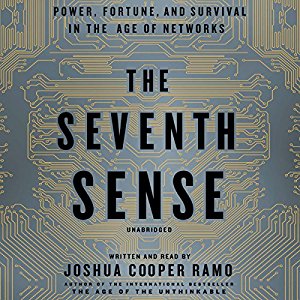 The Seventh Sense – Power, Fortune and Survival in the age of Networks – Joshua Cooper RamoThe digital age we live in is as transformative as the Industrial Revolution, and Joshua Cooper Ramo explains how to survive. If you find yourself longing for a disconnected world where information is not always at your fingertips, you may eventually be as useful as the carriage maker post-Henry Ford. It’s practically impossible to know where the marriage of imagination and technology will take us (sorry, Betamax and Kodak), and the only certainty is that in the networked world we will only become more intertwined. Is it possible not to become hopelessly tangled?
The Seventh Sense – Power, Fortune and Survival in the age of Networks – Joshua Cooper RamoThe digital age we live in is as transformative as the Industrial Revolution, and Joshua Cooper Ramo explains how to survive. If you find yourself longing for a disconnected world where information is not always at your fingertips, you may eventually be as useful as the carriage maker post-Henry Ford. It’s practically impossible to know where the marriage of imagination and technology will take us (sorry, Betamax and Kodak), and the only certainty is that in the networked world we will only become more intertwined. Is it possible not to become hopelessly tangled?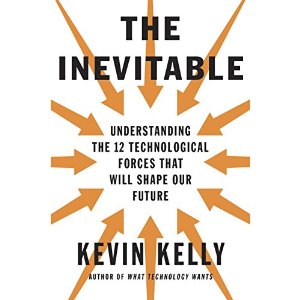 The inevitable – Understanding the 12 technological forces that will shape our future – Kevin KellyFrom one of our leading technology thinkers and writers, a guide through the 12 technological imperatives that will shape the next 30 years and transform our lives. Much of what will happen in the next 30 years is inevitable, driven by technological trends that are already in motion. In this fascinating, provocative new book, Kevin Kelly provides an optimistic road-map for the future, showing how the coming changes in our lives – from virtual reality in the home to an on-demand economy to artificial intelligence embedded in everything we manufacture – can be understood as the result of a few long-term accelerating forces. These larger forces will completely revolutionize the way we buy, work, learn, and communicate with each other. By understanding and embracing them, it will be easier for us to remain on top of the coming wave of changes and to arrange our day-to-day relationships with technology in ways that bring forth maximum benefits.
The inevitable – Understanding the 12 technological forces that will shape our future – Kevin KellyFrom one of our leading technology thinkers and writers, a guide through the 12 technological imperatives that will shape the next 30 years and transform our lives. Much of what will happen in the next 30 years is inevitable, driven by technological trends that are already in motion. In this fascinating, provocative new book, Kevin Kelly provides an optimistic road-map for the future, showing how the coming changes in our lives – from virtual reality in the home to an on-demand economy to artificial intelligence embedded in everything we manufacture – can be understood as the result of a few long-term accelerating forces. These larger forces will completely revolutionize the way we buy, work, learn, and communicate with each other. By understanding and embracing them, it will be easier for us to remain on top of the coming wave of changes and to arrange our day-to-day relationships with technology in ways that bring forth maximum benefits.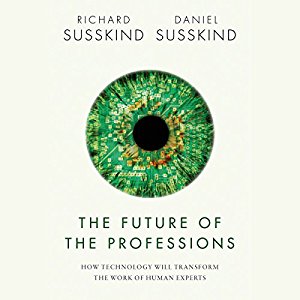 The future of the professions – How technology will transform the work of human experts – Richard Susskind, Daniel SusskindThis book predicts the decline of today’s professions and describes the people and systems that will replace them. In an Internet society, according to Richard Susskind and Daniel Susskind, we will neither need nor want doctors, teachers, accountants, architects, the clergy, consultants, lawyers, and many others to work as they did in the 20th century. The Future of the Professions explains how increasingly capable systems – from telepresence to artificial intelligence – will bring fundamental change in the way that the practical expertise of specialists is made available in society. The authors challenge the grand bargain – the arrangement that grants various monopolies to today’s professionals. They argue that our current professions are antiquated, opaque, and no longer affordable and that the expertise of the best is enjoyed by only a few. In their place, they propose six new models for producing and distributing expertise in society.The book raises important practical and moral questions. In an era when machines can outperform human beings at most tasks, what are the prospects for employment, who should own and control online expertise, and what tasks should be reserved exclusively for people? Based on the authors’ in-depth research of more than 10 professions, and illustrated by numerous examples from each, this is the first book to assess and question the relevance of the professions in the 21st century.
The future of the professions – How technology will transform the work of human experts – Richard Susskind, Daniel SusskindThis book predicts the decline of today’s professions and describes the people and systems that will replace them. In an Internet society, according to Richard Susskind and Daniel Susskind, we will neither need nor want doctors, teachers, accountants, architects, the clergy, consultants, lawyers, and many others to work as they did in the 20th century. The Future of the Professions explains how increasingly capable systems – from telepresence to artificial intelligence – will bring fundamental change in the way that the practical expertise of specialists is made available in society. The authors challenge the grand bargain – the arrangement that grants various monopolies to today’s professionals. They argue that our current professions are antiquated, opaque, and no longer affordable and that the expertise of the best is enjoyed by only a few. In their place, they propose six new models for producing and distributing expertise in society.The book raises important practical and moral questions. In an era when machines can outperform human beings at most tasks, what are the prospects for employment, who should own and control online expertise, and what tasks should be reserved exclusively for people? Based on the authors’ in-depth research of more than 10 professions, and illustrated by numerous examples from each, this is the first book to assess and question the relevance of the professions in the 21st century. Sapiens – a brief history of humankind – Yuval Noah Harari
Sapiens – a brief history of humankind – Yuval Noah Harari
Sapiens is a thrilling account of humankind’s extraordinary history from the Stone Age to the Silicon Age and our journey from insignificant apes to rulers of the world. Earth is 4.5 billion years old. In just a fraction of that time, one species among countless others has conquered it.
Us.
We are the most advanced and most destructive animals ever to have lived. What makes us brilliant? What makes us deadly? What makes us sapiens?In this bold and provocative audiobook, Yuval Noah Harari explores who we are, how we got here, and where we’re going.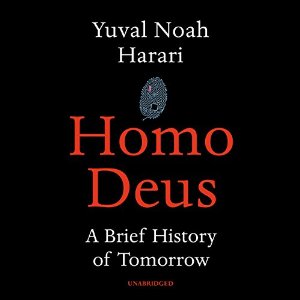 Homo Deus – a brief history of tomorrow – Yuval Noah HarariYuval Noah Harari envisions a not-too-distant world in which we face a new set of challenges. In Homo Deus, he examines our future with his trademark blend of science, history, philosophy and every discipline in between. Homo Deus explores the projects, dreams and nightmares that will shape the 21st century – from overcoming death to creating artificial life. It asks the fundamental questions: where do we go from here? And how will we protect this fragile world from our own destructive powers?This is the next stage of evolution. This is Homo Deus. War is obsolete. You are more likely to commit suicide than be killed in a conflict. Famine is disappearing. You are at more risk of obesity than starvation. Death is just a technical problem. Equality is out – but immortality is in. What does our future hold?
Homo Deus – a brief history of tomorrow – Yuval Noah HarariYuval Noah Harari envisions a not-too-distant world in which we face a new set of challenges. In Homo Deus, he examines our future with his trademark blend of science, history, philosophy and every discipline in between. Homo Deus explores the projects, dreams and nightmares that will shape the 21st century – from overcoming death to creating artificial life. It asks the fundamental questions: where do we go from here? And how will we protect this fragile world from our own destructive powers?This is the next stage of evolution. This is Homo Deus. War is obsolete. You are more likely to commit suicide than be killed in a conflict. Famine is disappearing. You are at more risk of obesity than starvation. Death is just a technical problem. Equality is out – but immortality is in. What does our future hold?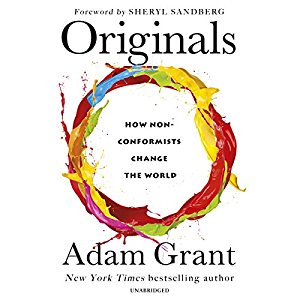 Originals – how non-conformists change the world – Adam Grant, Sheryl Sandberg – forewordThe New York Times best-selling author examines how people can drive creative, moral and organisational progress – and how leaders can encourage originality in their organisations. How can we originate new ideas, policies and practices without risking it all? Adam Grant shows how to improve the world by championing novel ideas and values that go against the grain, battling conformity and bucking outdated traditions.Using surprising studies and stories spanning business, politics, sports and entertainment, Grant explores how to recognize a good idea, speak up without getting silenced, build a coalition of allies, choose the right time to act and manage fear and doubt. Parents will learn how to nurture originality in children, and leaders will discover how to fight groupthink to build cultures that welcome dissent.
Originals – how non-conformists change the world – Adam Grant, Sheryl Sandberg – forewordThe New York Times best-selling author examines how people can drive creative, moral and organisational progress – and how leaders can encourage originality in their organisations. How can we originate new ideas, policies and practices without risking it all? Adam Grant shows how to improve the world by championing novel ideas and values that go against the grain, battling conformity and bucking outdated traditions.Using surprising studies and stories spanning business, politics, sports and entertainment, Grant explores how to recognize a good idea, speak up without getting silenced, build a coalition of allies, choose the right time to act and manage fear and doubt. Parents will learn how to nurture originality in children, and leaders will discover how to fight groupthink to build cultures that welcome dissent.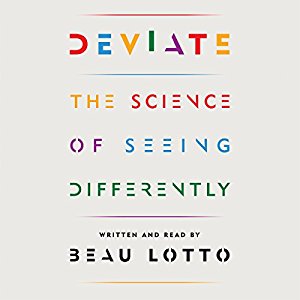 Deviate – the science of seeing differently – Beau LottoPerception is the foundation of human experience, but few of us understand how our own perception works. By revealing the startling truths about the brain and perception, Beau Lotto shows that the next big innovation is not a new technology: it is a new way of seeing.In his first major book, Beau Lotto draws on over a decade of pioneering research to show how our brains play tricks on us. With an innovative combination of case studies and optical and perception illusion exercises, Deviate will revolutionise the way you see the world.With this new understanding of how the brain works and its perceptive trickery, we can apply these insights to every aspect of life and work. Deviate is not just an engaging look into the neuroscience of thought, behaviour and creativity; it is a call to action, enlisting listeners in their own journeys of self-discovery.
Deviate – the science of seeing differently – Beau LottoPerception is the foundation of human experience, but few of us understand how our own perception works. By revealing the startling truths about the brain and perception, Beau Lotto shows that the next big innovation is not a new technology: it is a new way of seeing.In his first major book, Beau Lotto draws on over a decade of pioneering research to show how our brains play tricks on us. With an innovative combination of case studies and optical and perception illusion exercises, Deviate will revolutionise the way you see the world.With this new understanding of how the brain works and its perceptive trickery, we can apply these insights to every aspect of life and work. Deviate is not just an engaging look into the neuroscience of thought, behaviour and creativity; it is a call to action, enlisting listeners in their own journeys of self-discovery.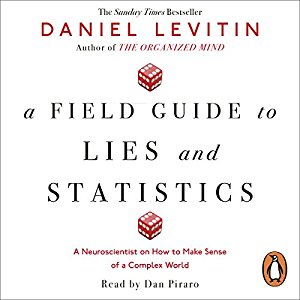 A field guide to Lies and Statistics – A Neuroscientist on How to Make Sense of a Complex World – Daniel LevitinWe live in a world of information overload. Facts and figures on absolutely everything are at our fingertips but are too often biased, distorted, or outright lies. From unemployment figures to voting polls, IQ tests to divorce rates, we’re bombarded by seemingly plausible statistics on how people live and what they think. In a world where anyone can become an expert at the click of a button, being able to see through the tricks played with statistics is more necessary than ever before. Daniel Levitin teaches us how to effectively ask ourselves: can we really know that? And how do they know that?In this eye-opening, entertaining and accessible guide filled with fascinating examples and practical takeaways, acclaimed neuroscientist Daniel Levitin shows us how learning to understand statistics will enable you to make quicker, better-informed decisions to simplify your life.
A field guide to Lies and Statistics – A Neuroscientist on How to Make Sense of a Complex World – Daniel LevitinWe live in a world of information overload. Facts and figures on absolutely everything are at our fingertips but are too often biased, distorted, or outright lies. From unemployment figures to voting polls, IQ tests to divorce rates, we’re bombarded by seemingly plausible statistics on how people live and what they think. In a world where anyone can become an expert at the click of a button, being able to see through the tricks played with statistics is more necessary than ever before. Daniel Levitin teaches us how to effectively ask ourselves: can we really know that? And how do they know that?In this eye-opening, entertaining and accessible guide filled with fascinating examples and practical takeaways, acclaimed neuroscientist Daniel Levitin shows us how learning to understand statistics will enable you to make quicker, better-informed decisions to simplify your life.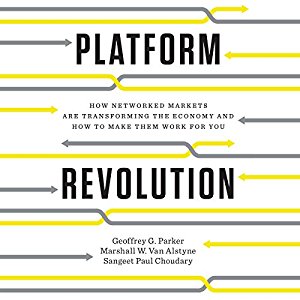 Platform Revolution – how networked markets are transforming the economy – Geoffrey G. Parker, Marshall W. Van Alstyne, Sangeet Paul ChoudaryFacebook, PayPal, Alibaba, Uber – these seemingly disparate companies have upended entire industries by harnessing a single phenomenon: the platform business model. Platform Revolution delivers the first comprehensive analysis of how platforms use technology to match producers and consumers in a multisided marketplace, unlocking hidden resources and creating new forms of value. When a company like Uber connects drivers with passengers, everybody wins – except traditional cab companies, which are scrambling to survive. Assumptions about operations, finance, strategy, and innovation all change. Platform Revolution explores the what, how, and why of this revolution and provides the first “owner’s manual” for creating a platform marketplace. Revealing the strategies behind some of today’s rising platforms, the authors explain how entrepreneurs – and traditional companies – can thrive in this new world. In cases as diverse as shoes, spices, dating, energy, home appliances, and education, Platform Revolution provides the essential guide to unlocking the potential of an economic landscape transformed.
Platform Revolution – how networked markets are transforming the economy – Geoffrey G. Parker, Marshall W. Van Alstyne, Sangeet Paul ChoudaryFacebook, PayPal, Alibaba, Uber – these seemingly disparate companies have upended entire industries by harnessing a single phenomenon: the platform business model. Platform Revolution delivers the first comprehensive analysis of how platforms use technology to match producers and consumers in a multisided marketplace, unlocking hidden resources and creating new forms of value. When a company like Uber connects drivers with passengers, everybody wins – except traditional cab companies, which are scrambling to survive. Assumptions about operations, finance, strategy, and innovation all change. Platform Revolution explores the what, how, and why of this revolution and provides the first “owner’s manual” for creating a platform marketplace. Revealing the strategies behind some of today’s rising platforms, the authors explain how entrepreneurs – and traditional companies – can thrive in this new world. In cases as diverse as shoes, spices, dating, energy, home appliances, and education, Platform Revolution provides the essential guide to unlocking the potential of an economic landscape transformed.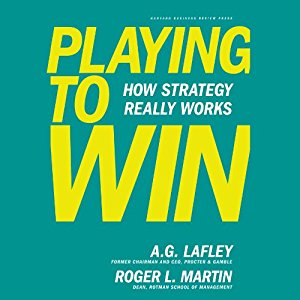 Playing to win – how strategy really works – A.G. Lafley, Roger L. MartinWinning CEO A.G. Lafley is now back at the helm of consumer goods giant Procter & Gamble. If you want to know the strategy he’ll use to restore P&G to its former dominance, read this book.Playing to Win, a noted Wall Street Journal and Washington Post bestseller, outlines the strategic approach Lafley, in close partnership with strategic adviser Roger Martin, used to double P&G’s sales, quadruple its profits, and increase its market value by more than $100 billion when Lafley was first CEO (he led the company from 2000 to 2009). The book shows leaders in any type of organization how to guide everyday actions with larger strategic goals built around the clear, essential elements that determine business success where to play and how to win.
Playing to win – how strategy really works – A.G. Lafley, Roger L. MartinWinning CEO A.G. Lafley is now back at the helm of consumer goods giant Procter & Gamble. If you want to know the strategy he’ll use to restore P&G to its former dominance, read this book.Playing to Win, a noted Wall Street Journal and Washington Post bestseller, outlines the strategic approach Lafley, in close partnership with strategic adviser Roger Martin, used to double P&G’s sales, quadruple its profits, and increase its market value by more than $100 billion when Lafley was first CEO (he led the company from 2000 to 2009). The book shows leaders in any type of organization how to guide everyday actions with larger strategic goals built around the clear, essential elements that determine business success where to play and how to win.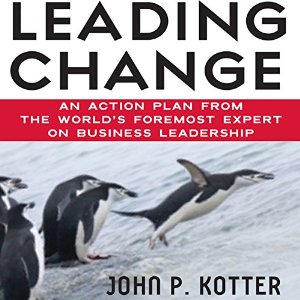 Leading Change – John P. KotterJohn Kotter, the world’s foremost expert on business leadership, distills 25 years of experience into Leading Change. A must-have for any organization, this visionary and very personal audiobook is at once inspiring, clear-headed, and filled with important implications for the future.The pressures on organisations to change will only increase over the next decades. Yet the methods managers have used to strengthen their companies—total quality management, re-engineering, right sizing, restructuring, cultural change, and turnarounds—routinely fall short. In Leading Change, Kotter identifies an eight-step process that every company must go through to achieve its goal, and shows where and how people—good people—often derail. Emphasising again and again the critical need for leadership to make change happen, Leading Change provides unprecedented access to our generation’s business master and a positive role model for leaders to emulate.
Leading Change – John P. KotterJohn Kotter, the world’s foremost expert on business leadership, distills 25 years of experience into Leading Change. A must-have for any organization, this visionary and very personal audiobook is at once inspiring, clear-headed, and filled with important implications for the future.The pressures on organisations to change will only increase over the next decades. Yet the methods managers have used to strengthen their companies—total quality management, re-engineering, right sizing, restructuring, cultural change, and turnarounds—routinely fall short. In Leading Change, Kotter identifies an eight-step process that every company must go through to achieve its goal, and shows where and how people—good people—often derail. Emphasising again and again the critical need for leadership to make change happen, Leading Change provides unprecedented access to our generation’s business master and a positive role model for leaders to emulate.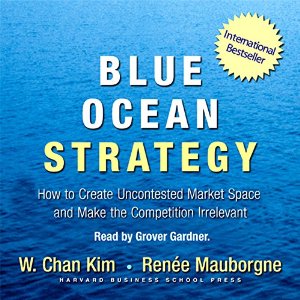 Blue Ocean Strategy (read it again) – how to create uncontested market space and make the competition irrelevant – W. Chan Kim, Renee MauborgneWinning by not competing! This international best-seller upends traditional thinking with principles and tools to make the competition irrelevant.In an audiobook that challenges everything you thought you knew, W. Chan Kim and Renee Mauborgne assert that tomorrow’s leading companies will succeed, not by battling their rivals for market share in the bloody “red ocean” of a shrinking profit pool, but by creating “blue oceans” of untapped new market spaces ripe for growth.Based on a study of 150 strategic moves, spanning more than 100 years and 30 industries, they provide a systematic approach that every company can use to render rivals obsolete and unleash new demand.
Blue Ocean Strategy (read it again) – how to create uncontested market space and make the competition irrelevant – W. Chan Kim, Renee MauborgneWinning by not competing! This international best-seller upends traditional thinking with principles and tools to make the competition irrelevant.In an audiobook that challenges everything you thought you knew, W. Chan Kim and Renee Mauborgne assert that tomorrow’s leading companies will succeed, not by battling their rivals for market share in the bloody “red ocean” of a shrinking profit pool, but by creating “blue oceans” of untapped new market spaces ripe for growth.Based on a study of 150 strategic moves, spanning more than 100 years and 30 industries, they provide a systematic approach that every company can use to render rivals obsolete and unleash new demand.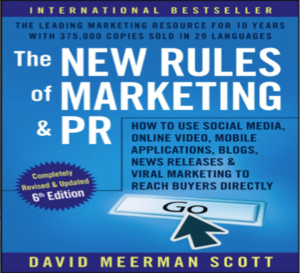 The New Rules of PR and Marketing (6th edition) – How to use Social Media, Blogs, New Releases, Online Video, and Viral Marketing to Reach Buyer Directly – David Meerman Scott
The New Rules of PR and Marketing (6th edition) – How to use Social Media, Blogs, New Releases, Online Video, and Viral Marketing to Reach Buyer Directly – David Meerman Scott
When it comes to marketing, anything goes in the Digital Age, right? Well, not quite. While marketing and public relations tactics do seem to change overnight, every smart businessperson knows that it takes a lot more than the ‘next big thing.’The New Rules of Marketing & PR is an international bestseller with more than 375,000 copies sold in twenty-nine languages from Albanian to Vietnamese. In the latest 6th edition of this pioneering guide to the future of marketing, you’ll get a step-by-step action plan for leveraging the power of the latest approaches to generating attention for your idea or your business. You’ll learn how get the right information to the right people at the right time—at a fraction of the cost of traditional advertising.For professionals, entrepreneurs, business owners, and professors alike, this pioneering guide offers actionable strategies that can be implemented immediately.
All the best for the festive season, and if you celebrate – have a Merry Christmas or a Happy Hanukah or both, and enjoy a well-deserved break!
